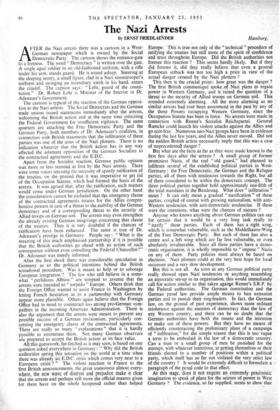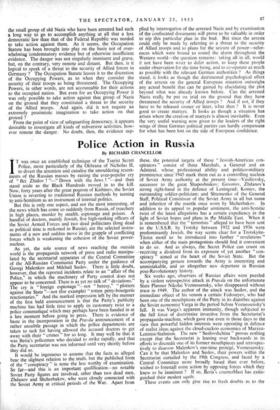The Nazi Arrests
AFTER the Nazi arrests there was a cartoon in a West- German newspaper which is owned by the Social Democratic Party. The cartoon shows the entrance-gate to a fortress. The word " Democracy" is written over the gate.
A single aged soldier in an old-fashioned uniform, with a rifle under his arm, stands guard. He is sound asleep. Sneering at the sleeping sentry, a small figure, clad in a Nazi stormtrooper's uniform and swinging an incendiary torch in his hand, enters the citadel. The caption says : "Lehr, guard of the consti- tution." Dr. Robert Lehr is Minister of the Interior in Dr. Adenauer's Government.
The cartoon is typical of the reaction of the German opposi- tion to the Nazi arrests. The Social Democrats and the German trade unions issued statements immediately after the arrests, welcoming the British action and at the same time criticising the Federal Government for insufficient vigilance. The same quarters are attacking the Free Democratic Party and the German Party, both members of Dr. Adenauer's coalition, in connection with British statements that the infiltration of these. parties was one of the aims of the Nazi plotters. There is no indication whatever that the British action has in any way affected the adamant opposition of the German Socialists to the contractual agreements and the E.D.C. Apart from the Socialist reaction, German public opinion was more or less stunned at first by the Nazi arrests. There were some voices stressing the necessity of speedy ratification of the treaties, on the ground that it was imperative to get rid of the Occupation Statute, which had formed the basis of the arrests. It was agreed that, after the ratification, such matters would come under German jurisdiction. On the other hand the consideration cannot be excluded that tlite emergency clause of the contractual agreements retains for the Allies compre- hensive powers in case of a threat to the.stability of the German democracy and of a corresponding threat to the security of Allied troops on German soil. The arrests may even strengthen the already existing German misgivings concerning that clause of the treaties. Thus it is very doubtful if the chances of ratification have been enhanced. The same is true of Dr.
Adenauer's prestige in Germany'. People say: "What is the meaning of this much emphasised partnership if it is possible that the British authorities go ahead with an action of such consequence without even consulting the Federal Chancellor?" Dr. Adenauer was merely informed.
After the first shock there was considerable speculation in Germany as to the political intentions behind the British sensational procedure. Was it meant to help or to sabotage European integration ? The few who still believe in a some- what "perfidious Albion" are tempted to assume that the arrests were intended to " torpedo " Europe. Others think that the Foreign Office wanted to assist France in Washington by letting French hesitation as to a partnership with Germany appear more plausible. 'Others again believe that the Foreign Office had in mind to counteract too strong pro-German sym- pathies in the incoming American Administration. There is also the argument that the arrests were meant to prevent any possible success of a German revisionism, particularly con- cerning the emergency clause of the contractual agreements. There are really so many " explanations " that it is hardly possible to enumerate them. Not many German observers are prepared to accept the British action at its face value. All this guesswork, far-fetched as it may seen, is based on one question asked everywhere in Germany: "Why did the British• authorities spring this sensation on the world at a time when there was already an E.D.C. crisis which comes very near to a European crisis ? " The violent reaction in France to the first British announcements, the great uneasiness almost every- where, the new wave of distrust and prejudice make it clear that the arrests and perhaps still more the official reasons given for them have on the whole hampered rather 'than helped Europe. This is true not only of the " technical " procedure of ratifying the treaties but still more of the spirit of confidence and trust throughout Europe. Did the British authorities not foresee this reaction ? This seems hardly likely. 'But if they did foresee it, did they really believe that even a general European setback was not too high a price in view of the actual danger created by the Nazi plotters ? This then is the crucial point: how great was the danger? The first British communiqué spoke_of Nazi plans to regain -power in Western Germany, and it raised the question of a threat to the security of Allied troops on German soil. This sounded extremely alarming. All the more alarming as no similar arrests had ever been announced in the past by any of the three Powers occupying Western Germany, since the Occupation Statute has been in force. No arrests were made in connection with Remer's Socialist Reichspartei. General Ramcke could launch his violent attacks against the Allies and go scot-free. Numerous neo-Nazi groups have been in evidence during the last few years, and the Allies never moved. Did not the sudden British action necessarily imply that this was a case of unprecedented danger.?
But what are the facts as far as they were made known in the first few days after the arrests ? A small group of former prominent Nazis, of the real "old guard," had planned to infiltrate se,veral of the established political parties in West- Germany : the Free Democratic, the German and the Refugee • parties, all of them with tendencies towards the Right, but all of them considered to be within the democratic concept. The three political parties together hold approximately one-fifth of the total mandates in the Bundestag. What does " infiltration " mean ? It can only mean a gradual " nazification" of these parties, coupled of course with growing nationalism, with anti- Western tendencies, with anti-democratic tendencies. If these were the intentions, what were the chances of success ?
Anyone who knows anything about German politics can say for certain that it would be a. very long task really to " nazify " these parties. Each of them has a right wing, which is somewhat vulnerable, such as the Middelhauve-Wing of the Free Democratic Party. But each of them has also a centre and a left wing which are far less vulnerable, or even absolutely invulnerable. Since all these parties have a demo- cratic organisation, it is wholly impossible to " impose " Nazis on any of them. Party policies must always be based on elections. Nazi plotters could at the very best hope for local successes and a very slow development.
But this is not all. As soon as any 'German political party really showed open Nazi- tendencies or anything resembling an autocratic set-up in its organisation, this would immediately call for action similar to that taken against Remer's S.R.P. by the Federal authorities. The German constitution and the German penal law provide ample means to ban extremist parties and to punish their ring-leaders. In fact, the German law, on the ground of past experience, shows more militant intolerance against the enemies of democracy than the law of any Western country, and there can be no doubt that the German authorities have both the means and the intention to make use of these powers. But they have no means of efficiently counteracting the preliminary 'plaits of a campaign of "infiltration," for the simple reason that this is too vague a term to be embodied in the law of a democratic country. Can a man or a small group of men be punished for the attempt, with whatever intentions, at getting themselves or their friends elected to a nuniber of positions within a political party, which itself has so far not violated the very strict law of the country ? It would be extremely difficult to formulate a • paragraph of the penal code to that effect.
At this stage, does it not require an extremely pessimistic imagination to speak of plans for the seizure of power in West Germany ? The evidence, so far supplied, seems to show that the small group of old Nazis who have been arrested had such a long way to go to accomplish anything at all that a less democratic law than that of the Federal Republic was needed to take action against them. As it seems, the Occupation Statute has been brought into play on the basis not of over- whelming 'condemnatory evidence but of otherwise insufficient evidence. The danger was not singularly imminent and grave, but, on the contrary, very remote and distant. But then, is it logical to speak of a threat to the security of Allied forces in Germany ? The Occupation Statute leaves it to the discretion of the Occupying Powers, as to when they consider the security of their troops as being threatened. The Occupying Powers, in other words, are not accountable for their actions to the occupied nation. But even for an Occupying Power it was only possible to take action against that group of Nazis on the ground that they constituted a threat to the security of the 'Allied troops. And again, did it not require an _extremely pessimistic imagination to take action on that ground ?
From the point of view of safeguarding democracy, it appears desirable to investigate all kinds of subversiVe activities, how- ever remote the danger. No doubt, then, the evidence sup- plied by interrogation of the arrested Nazis and by examination of the confiscated documents will prove to be valuable in order to nip this particular plan in the bud. But since the arrests could only be made by referring to a threat to the security of Allied troops and to plans for the seizure of power—refer- ences which were bound to sound the alarm throughout the Western world—the question remains : taking all in all, would it not have been wiser to defer action, to keep these people under observation for the time being, and to co-operate as much as possible with the relevant German authorities ? As things stand, it looks as though the detrimental psychological effect of the arrests on the general European situation outweighs any actual benefit that can be gained by elucidating the plot beyond what was already known before. Can the arrested Nazis really be put on trial on the ground that they have threatened the security of Allied troops ? And if not, if they have to be released sooner or later, what then ? It is never good to 'create martyrs. It looks as though a situation has arisen where the creation of martyrs is almost inevitable. Even the very useful warning now given to the leaders of the right wings of three German political parties can hardly compensate for what has been lost on the side of European confidence.



































 Previous page
Previous page